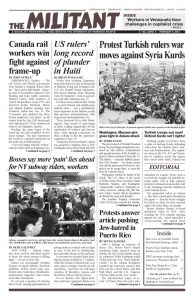LONDON — Over 2,000 people marched here Jan. 14 to mark seven months since the Grenfell Tower fire, which killed 71 people and left hundreds homeless. The fire was fed by cladding on the building’s exterior that was a known fire hazard.
Led by survivors holding large paper mache green hearts with one-word slogans like “justice” and “dignity,” marchers circled the streets around the tower in silence for over an hour.
Residents of this working-class area, located in the Royal Borough of Kensington and Chelsea — the wealthiest, and also the most class-divided borough in the country — were joined by supporters from across the city. Similar actions are held on the 14th of each month.
The capitalist rulers have failed to rehouse the survivors and have done little to implement fire safety measures in housing blocks across the country.
“Almost 100 families spent Christmas in hotel rooms, sleeping side by side in shared rooms, what’s left of their belongings stacked in boxes by their beds,” Natasha Elcock, who escaped from Grenfell Tower with her partner and 6-year-old daughter, wrote in the Dec. 27 Guardian. She is a member of Grenfell United, a group representing fire survivors.
At the end of 2017, only 49 families had been permanently rehoused. Fifty-seven are in temporary housing, with the rest, 101 families, still in hotel rooms.
“Seventy-one of our loved ones died in that fire,” Elcock wrote. “They died because we were ignored when we had raised questions about the refurbishment of the tower long beforehand.”
“We need homes and support for the trauma we are suffering. We need to know the truth of what happened, and we need justice,” she said. “Most of all, we need to be treated as humans, not numbers.”
Prime Minister Theresa May initially said she hoped to rehouse everyone within three weeks of the fire. The government later said the local council was aiming for a Christmas deadline. Council leader Elizabeth Campbell now says she is “absolutely” hoping to have everyone in homes within a year.
The local council has set a budget of £235 million ($325 million) to buy 300 new properties for those displaced. But “given that Kensington and Chelsea is one of the most expensive places in Britain to buy property, this has been a massive undertaking,” the Guardiansaid. The idea that landlords should miss out on a penny when workers have lost everything is clearly off the radar.
This stands in sharp contrast to revolutionary Cuba, where workers and farmers took political power in 1959 and nationalized the land and housing stock. In Our History Is Still Being Written: The Story of Three Chinese Cuban Generals in the Cuban Revolution, Gen. Moisés Sío Wong describes how the government organized workers to deal with the damage from Hurricane Michelle in 2001. They mobilized to rebuild 160,000 homes within a year, including 13,000 that had been totally destroyed.
Safe homes vs. profits
Tower blocks in 262 other locations failed safety tests on cladding on their buildings since Grenfell, and the government has ordered their removal. But the multimillionaire owners of the Citiscape building in Croydon, South London — like at other properties where residents have bought their apartments — are refusing to go ahead with the work until families living there agree to foot the £2 million bill, over $43,000 for each apartment.
The majority of the housing blocks, however, are owned by local authorities. Cladding has been removed from only 17 of those.
Residents of Latham House in Tower Hamlets, East London, recently presented a petition to the local council demanding checks be done on the cladding. Residents of Anglia House, another building under the same authority, have demanded the immediate fitting of sprinklers.
Campbell has refused to commit Kensington and Chelsea Council to installing sprinklers in other buildings it owns. “I have friends living in the four towers that overlook Grenfell. They see the burnt building every morning, and every night they go to bed knowing their tower also lacks sprinklers,” Elcock wrote.
When Communist League members knocked on doors to introduce the party and talk to workers in one of these blocks Jan. 20, many expressed outrage at the council’s inaction on safety measures.
The government has attempted to focus attention on a public inquiry — chaired by retired Judge Martin Moore-Bick — into the causes of the fire, in hopes of shifting attention away from the need for action on rehousing and fire safety measures. Opposition Labour Party politicians have played their part in bolstering illusions in the inquiry.
A proposal to include panelists “with relevant background, expertise, experience, and a real understanding of the issues facing those affected,” was backed by many survivors, who collected 22,000 signatures for it. Prime Minister Theresa May turned down the proposal Dec. 22.
Tiago Alves, a 20-year-old who lived on the 13th floor of Grenfell, put his finger on the rulers’ game in a recent heated exchange with council officials. “You are trying to eat away at us slowly, slowly, slowly, in an attempt to break us up,” he told the Guardian. But despite the best attempts of the government, both local and national, Grenfell remains a feature of their political crisis.

